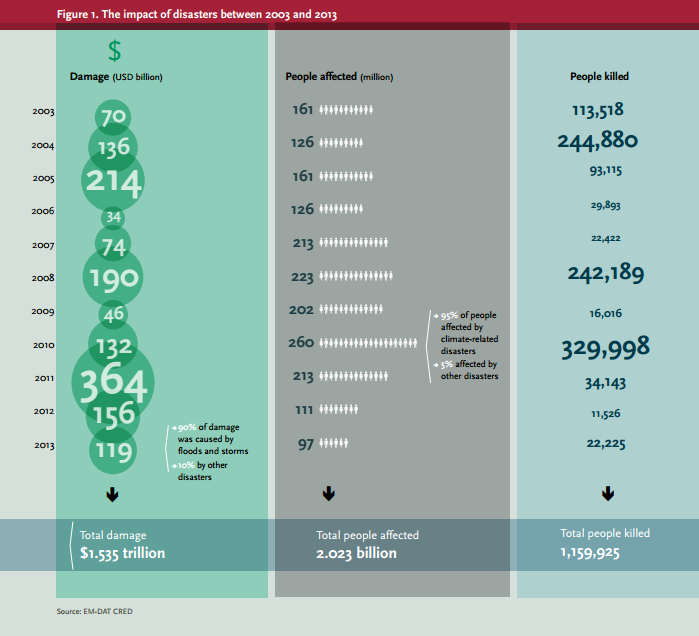How much do natural disasters cost the world?

Natural disasters caused a total of $1.5 trillion in damage worldwide between 2003 and 2013, according to a study by the United Nations Food and Agriculture Organization (FAO), which finds they caused more than 1.1 million deaths and affected the lives of more than two billion people.
Source: FAO
Researchers also found an increase in the frequency and severity of natural disasters over the past three decades, with a corresponding rise in economic losses.
Source: FAO
The study is based on a sample of 78 needs assessments undertaken in the aftermath of disasters between 2003 and 2013. It covered 48 countries in Africa, Asia-Pacific, and Latin America and the Caribbean.
Developing countries are disproportionately affected by natural disasters, which often undermine overall economic growth and development and hit the agriculture sector particularly hard.
Source: FAO
The study examined the impact of natural disasters on the agriculture sector and global food security. It showed that at least 22% of the damage caused in developing countries between 2003 and 2013 was in the agriculture sector.
The most devastating natural disaster for the agricultural sector was the 2008-2011 Kenya drought, which caused damage worth 10.5 billion US dollars to the country’s agriculture. Next worst was the 2010 flooding in Pakistan which cost 5.3 billion dollars.
To keep up with the Agenda subscribe to our weekly newsletter.
Author: Emma Luxton is a Junior Content Producer at Formative Content.
Image: A palm tree is damaged on a beach near Port Vila, the capital city of the Pacific island nation of Vanuatu March 14, 2015. REUTERS/Kris Paras
Don't miss any update on this topic
Create a free account and access your personalized content collection with our latest publications and analyses.
License and Republishing
World Economic Forum articles may be republished in accordance with the Creative Commons Attribution-NonCommercial-NoDerivatives 4.0 International Public License, and in accordance with our Terms of Use.
The views expressed in this article are those of the author alone and not the World Economic Forum.
Stay up to date:
Future of the Environment
Related topics:
Forum Stories newsletter
Bringing you weekly curated insights and analysis on the global issues that matter.
More on Geo-Economics and PoliticsSee all
Isabel Cane and Rob Strayer
November 13, 2025









